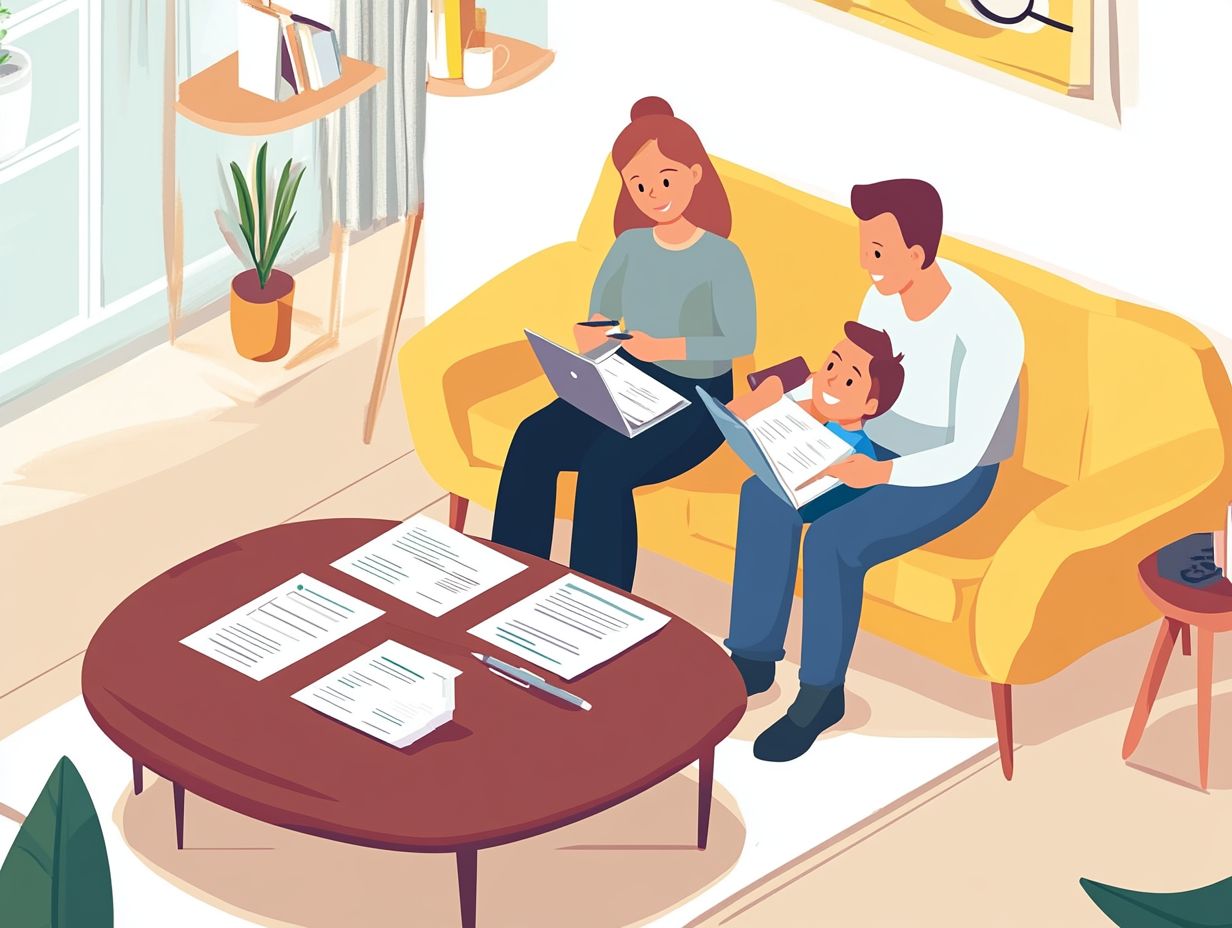How to Make Your Home Insurance More Affordable?
Home insurance is an essential safeguard for your most significant investment your home. Navigating its complexities and costs can feel overwhelming, but we re here to help!
Let s explore the essentials of home insurance together, covering different types of coverage and the key factors that influence rates.
You ll discover practical strategies for lowering your premiums, including savvy tips on comparison shopping, increasing deductibles, and enhancing your home s security.
Understanding how to maintain good credit and maximize discounts can make insurance more affordable for you. Join us as we demystify home insurance and empower you to protect your home without straining your budget.
Contents
- Key Takeaways:
- Understanding Home Insurance
- Factors that Affect Home Insurance Rates
- Introduction
- Ways to Lower Home Insurance Costs
- Additional Tips for Affordable Home Insurance
- Frequently Asked Questions
- How can I make my home insurance more affordable?
- Is it possible to negotiate lower rates with my insurance company?
- Can I lower my home insurance premiums by increasing my deductible?
- What are some safety features that can reduce my home insurance costs?
- Are there any discounts available for home insurance?
- Can I save money by bundling my home insurance with other policies?
Key Takeaways:

- Shop around for the best home insurance rates. Compare multiple companies to find the best fit for your needs!
- Raise your deductibles to lower your monthly payments. Just ensure you have enough saved for emergencies!
- Improve your home security to qualify for potential discounts on your home insurance. Simple measures like installing a security system or deadbolts can help lower your premiums.
Understanding Home Insurance
Grasping the nuances of home insurance is crucial for homeowners like you. It offers the financial shield you need against unexpected events that could threaten your property or personal belongings.
This coverage includes various elements, such as the types of policies available, factors that influence your rates, and the essential role that insurance companies and agents play in guiding you to the right policy for your unique situation.
By understanding the complexities of homeowners insurance, you enable yourself to make informed choices. This ensures your financial stability in the aftermath of disasters be it a fire or a natural calamity thus effectively safeguarding your valuable assets.
What is Home Insurance?
Home insurance, often referred to as homeowners insurance, is your financial safety net against losses related to your home and personal belongings. This essential policy covers a wide array of risks, ensuring both the physical structure of your residence and the cherished items within it are well-protected.
At the heart of this coverage is dwelling protection, which shields you from damages to your home caused by unforeseen events like fires or storms. Personal property coverage extends this protection to your belongings, including furniture and electronics, safeguarding you from losses due to theft or damage.
Liability protection is another critical aspect, offering you coverage for legal expenses should someone be injured on your property. In this intricate landscape, insurance companies assess the risks associated with your property to tailor the terms and premiums of your policy, ensuring that you receive coverage aligned with your unique needs.
Types of Coverage
There is a variety of coverage available under homeowners policies, including dwelling coverage, personal property coverage, liability coverage, and additional living expenses each crafted to protect you from different risks.
Navigating these options is crucial. For instance, while dwelling coverage secures the structure of your home, adding options like flood insurance is vital if you’re in a flood-prone area.
Assess personal property coverage to protect your belongings, recognizing that some valuable items may require additional riders to ensure full protection. Liability coverage serves as your safeguard against potential lawsuits stemming from injuries that occur on your property, providing you with peace of mind.
By familiarizing yourself with these coverages, you enable yourself to make better-informed decisions. This ultimately helps you tailor policies that effectively meet your unique needs.
Factors that Affect Home Insurance Rates
Several factors play a crucial role in influencing your home insurance rates, such as the location and value of your property, your personal background, and the insurance company’s specific approach to risk assessment and pricing.
If your home is situated in an area vulnerable to natural disasters, you may encounter higher premiums due to the elevated risk. The worth of your home and its contents is also vital in determining the coverage you require.
Introduction
Understanding how to manage your home insurance rates is crucial for homeowners. Several factors influence these rates, and by being informed, you can make better decisions.
Location and Property Value

Your home’s geographical location and assessed property value are important parts of determining your homeowners insurance rates. They directly influence the risk profile that insurance companies assess.
For example, if your home is in an area prone to flooding or hail storms, you might face higher premiums due to the increased risk of damage recognized by insurers.
In regions where natural disasters are common, like coastal zones or cities known for severe weather, having comprehensive coverage becomes essential.
The overall value of your property also plays a crucial role in how much coverage you should consider. Homes with higher values typically require more extensive policies to protect against potential losses.
Your previous claims history affects your rates. Frequent claims can lead to higher costs, reinforcing the notion that both your location and experience significantly shape your insurance expenses.
Personal Factors
Personal factors like your credit record and history of consumer complaints have a considerable influence on your home insurance rates and eligibility.
Insurance companies carefully assess these elements because they correlate with potential risk. If you have a solid credit history, you may be seen as a lower-risk candidate, leading to better pricing and enhanced coverage options.
On the flip side, a poor credit score might result in higher premiums or even outright denials of coverage. Understanding this can empower you to take control of your insurance landscape.
Maintaining a strong credit record demonstrates responsibility and can translate into significant savings on your insurance costs, underscoring the vital connection between personal finance and home insurance.
Ways to Lower Home Insurance Costs
Homeowners have various effective strategies to reduce home insurance costs. By exploring competitive rates from different providers, raising deductibles, and improving home security measures, you can take action now. Additionally, knowing how to prepare for a home insurance renewal can help you dramatically reduce your risks!
These proactive steps can lead to substantial discounts on your premiums, ultimately saving you money.
Comparison Shopping
Comparison shopping is essential for homeowners to discover the best home insurance policy by evaluating various insurance companies and their offerings.
By investing time to gather multiple quotes, you can unveil a spectrum of options tailored to your unique needs and financial situation. This process includes online research and reaching out to local insurance agents who can offer valuable insights into policy details, coverage limits, and potential discounts.
Engaging with these professionals often grants you a clearer understanding of how each policy operates, enabling you to weigh the pros and cons effectively. Your goal is to ensure that the selected policy aligns seamlessly with your budget and expectations.
Increasing Deductibles
One effective way to lower your home insurance premiums is by increasing your deductible, which is the amount you pay before your insurance starts to help. Additionally, knowing how to prepare for a home insurance renewal can further assist you in making informed decisions.
By opting for a higher deductible, you can enjoy immediate savings on your monthly premium costs, making this an appealing choice if you’re looking to manage your expenses.
However, this strategy requires careful consideration, as it means you ll incur more significant out-of-pocket costs in the event of a claim. The key is to strike a balance between an affordable premium and the risk of unforeseen damages.
Evaluating your personal finances, the potential risks associated with homeownership, and the likelihood of filing claims can help you make an informed decision that aligns with your budget and peace of mind.
Start exploring these strategies today and take control of your insurance costs!
Improving Home Security

Improving your home s safety is a proactive approach that not only enhances your property s security but also opens the door to substantial insurance discounts.
By investing in advanced alarm systems, you can deter potential intruders. Plus, you ll receive immediate alerts in case of any breaches.
Upgrading to high-quality locks further fortifies your entry points. Reinforcing your windows with impact-resistant materials adds another layer of protection.
Each of these improvements sends a clear message to insurance companies that risks have been significantly minimized. This often results in lower premiums for you.
These financial advantages can positively influence your overall home expenses, seamlessly aligning personal safety with cost savings.
Additional Tips for Affordable Home Insurance
Maximizing discounts and maintaining an excellent credit record are vital strategies for homeowners seeking affordable home insurance. Additionally, it’s important to learn how to protect your home against insurance fraud.
By doing so, you can secure comprehensive coverage against various risks while keeping costs manageable.
Maximizing Discounts
Homeowners have a great opportunity to significantly reduce their insurance costs by fully utilizing the discounts insurance companies offer. These discounts can vary based on many factors.
For instance, bundling your home and auto insurance could unlock a delightful discount. Claims-free rewards celebrate your status as a responsible policyholder.
Many insurers also provide loyalty discounts for those who have maintained long-term relationships, acting as a thank-you gift for your commitment.
Talk to your insurance agent today to discover savings just for you!
By understanding and leveraging these available discounts, you can unlock substantial savings that make a real difference.
Maintaining Good Credit
Maintaining a solid credit record is essential for homeowners, as it can significantly impact both your insurance rates and overall financial stability.
A strong credit history doesn t just help you secure lower premiums; it signals reliability to insurers, opening the door to better coverage options.
Regularly checking your credit report is crucial since inaccuracies can lead to inflated costs that you could easily avoid.
By taking proactive measures to enhance or maintain a robust credit score like paying your bills on time, reducing outstanding debts, and keeping credit utilization low you can position yourself favorably in the eyes of insurance providers.
Ultimately, understanding the connection between credit and insurance can lead to significant savings and peace of mind.
Frequently Asked Questions
How can I make my home insurance more affordable?

There are several ways to make your home insurance more affordable, such as bundling your policies, increasing your deductible, and saving on home insurance costs by installing safety features in your home.
Is it possible to negotiate lower rates with my insurance company?
Yes, you can negotiate lower rates with your insurance company. Ask for discounts, review your coverage, and shop around for better deals.
Yes, increasing your deductible can lower your home insurance premiums. However, make sure you can afford to pay the higher deductible in the event of a claim.
What are some safety features that can reduce my home insurance costs?
Installing safety features such as smoke detectors, security systems, and deadbolts can help reduce your home insurance costs.
Are there any discounts available for home insurance?
Yes, many insurance companies offer discounts for various factors, such as having a good credit score, being a non-smoker, and having a claim-free history.
Can I save money by bundling my home insurance with other policies?
Yes, bundling your home insurance with other policies, such as auto or life insurance, can often result in a discount from your insurance company.





